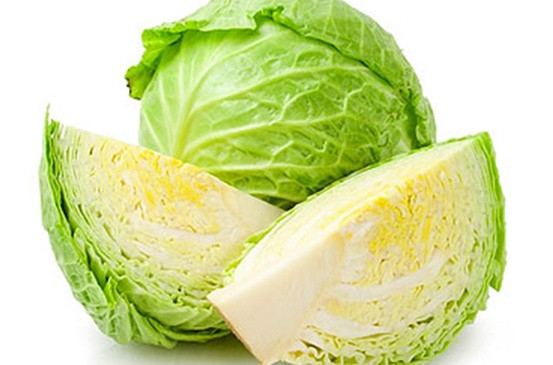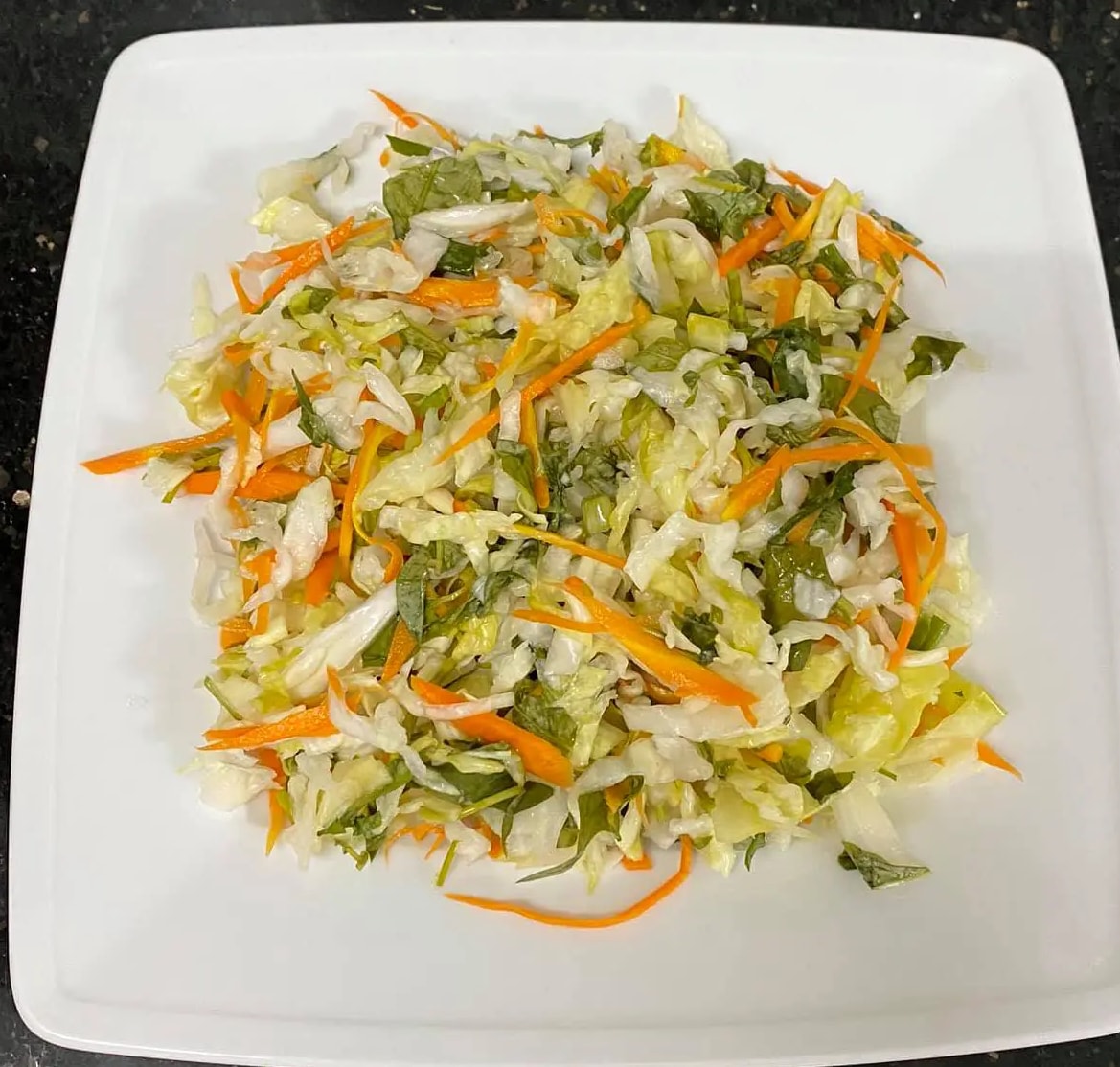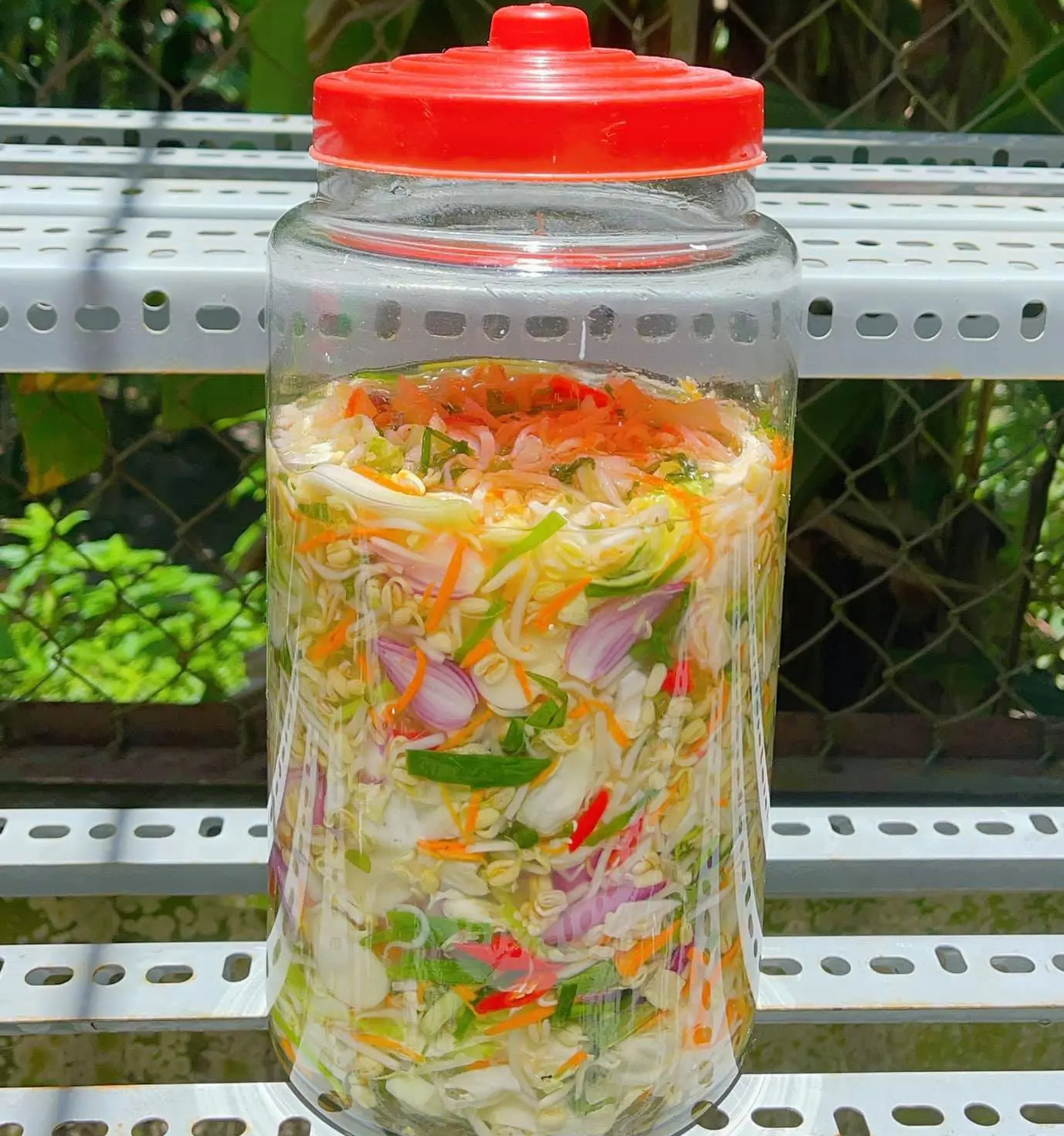5 health benefits of eating sauerkraut
Sauerkraut is a popular form of cabbage preservation and one of the oldest traditional dishes, with many beneficial effects on human health.
1. Nutritional composition of pickled cabbage
Sauerkraut is a popular dish that has surprising health benefits. It contains high amounts of lactic acid and tyramine, as well as vitamins and minerals, and is low in calories.
A 50g serving of sauerkraut provides approximately:
4kcal 0.6g protein 0.0g fat 0.6g carbohydrate 1.5g fiber 25mg calcium 90mg potassium 5mg vitamin C 0.74g salt.

2. Fermentation process of sauerkraut
Fermentation creates a variety of flavors and aromas, but also enriches foods with proteins, vitamins, amino acids, and essential fatty acids during the fermentation process. In addition to fermented drinks and sauces, another classic method is fermenting vegetables, including cabbage.
Sauerkraut during the fermentation process will produce beneficial probiotics, called lacto-fermentation. The beneficial bacteria Lactobacillus is one of the same bacteria found in yogurt and many other fermented foods such as kimchi, miso, kefir…
When soaked in salt water, bacteria begin to convert the sugars in the cabbage into lactic acid, a natural preservative that inhibits the growth of harmful bacteria.
Several scientific reviews have found that fermented pickling vegetables like cabbage are linked to significantly better glucose metabolism, a lower risk of type 2 diabetes, a stronger immune system, lower triglyceride levels, and higher HDL (good) cholesterol.
The benefits appear to come in part from the fiber, vitamins, minerals, and other chemicals retained during fermentation. Additionally, the live bacteria in fermented fruits and vegetables may provide additional benefits for gut health and metabolism.

3. Top Health Benefits of Sauerkraut
Beneficial source of nutrition
Sauerkraut is a good source of fiber as well as vitamins and minerals and as a fermented food, it promotes the growth of beneficial probiotics which are important for digestive health. The nutritional value of foods such as cabbage can be enriched through fermentation which helps us digest food more easily. This is because sauerkraut contains enzymes that help the body break down food into smaller, more digestible molecules, thereby allowing more nutrients to be absorbed.
May support the immune system
According to Associate Professor, Dr. Nguyen Thi Lam, former Deputy Director of the National Institute of Nutrition, a balanced intestinal microflora contributes to 80% of the body's immune status. The intestinal microflora is a barrier that protects human health, strengthens the immune system, and helps fight disease. When the immune system is weakened, people are more susceptible to disease and get sick more often. The process of fermenting food will create many bacteria and yeasts that are beneficial for intestinal health.
Most of our immune system is located in the gut, so it’s no surprise that the gut-supporting properties of sauerkraut can also be beneficial. The good bacteria, or probiotics, found in sauerkraut help keep the lining of your digestive system healthy. A strong gut lining prevents any unwanted substances or toxins from “leaking” into your body and causing an immune response. These same bacteria can also support natural antibodies and reduce the risk of infection. In addition to being a source of probiotics, sauerkraut also provides vitamin C and iron, nutrients known to support a stronger immune response.
May support heart health
There are several factors in sauerkraut that support heart health. Being rich in fiber and a source of beneficial probiotic bacteria makes sauerkraut helpful in balancing cholesterol levels. Cabbage is a good source of potassium and its probiotic content can have a blood pressure lowering effect. Sauerkraut is also a source of vitamin K2 which helps prevent calcium buildup in the arteries, a possible cause of atherosclerosis.
May improve mood and behavior
The gut impacts our mood, and fermented foods like sauerkraut may play a role. Certain strains of probiotic bacteria, including Lactobacillis helveticus and Bifidobacteria longum, commonly found in fermented foods, can improve symptoms of anxiety and depression. These beneficial bacteria promote a healthier balance in the gut and, through the production of compounds called short-chain fatty acids, help reduce inflammation, promoting a healthier gut environment.
Fermented foods may also support mood and behavior by promoting gut absorption of mood-balancing micronutrients, such as magnesium and zinc.
Prevents oxidative damage
Rich in compounds like sulforaphane, cabbage is a valuable vegetable to add to your diet. This is because these beneficial compounds appear to prevent oxidative damage and may act in a protective way against cancers, including colorectal cancer. In a similar way, fermented cabbage appears to play an effective role.
Consuming probiotic-rich foods and beverages is one of the best ways to support gut health, especially when taking antibiotics. In fact, a 2019 review published in the Journal of Microbiology and Biotechnology found that consuming probiotics while taking a course of antibiotics can improve and potentially even restore the microbiome afterward.
4. Is sauerkraut safe for everyone?
It should be noted that most fermented foods are safe, but they can still be contaminated with pathogenic bacteria such as Salmonella, Ecoli, etc.
Sauerkraut is safe for most people, but because it is rich in histamine, people with histamine intolerance may experience side effects after eating it. Additionally, if you are new to fermented foods or are not used to a high-fiber diet, you may experience symptoms such as bloating and gas.
Although fermented foods like sauerkraut may provide us with health benefits, for some people, fermented foods cause serious health problems.
People who are taking prescription medications, such as monoamine oxidase inhibitors (MAOIs), should be cautious when including sauerkraut in their diet. This is because sauerkraut can be high in tyramine, although the amount seems to vary widely.
Sauerkraut requires a certain amount of salt, so people with medical conditions such as high blood pressure, heart disease, kidney disease, stomach disease, etc. should not eat it. People with serious illnesses or immunodeficiency should consult their doctor or nutritionist before using fermented foods.

When making sauerkraut, always make sure to use sterile equipment and carefully follow the fermentation time and temperature. Photo illustration: Uyen Bac Hai
5. Notes when pickling cabbage at home
The ingredients for making pickled cabbage are very simple, including cabbage, salt, and a glass container to preserve it during fermentation. Some people also add carrots or herbs such as Vietnamese coriander, spring onions, etc.
How to make: Wash the cabbage, drain, cut into strips, mix with salt and massage until soft. Put the cabbage in a jar, make sure to cover it with water. This is very important because the cabbage needs to be submerged in liquid during fermentation. Store in the refrigerator. The cabbage will begin to secrete liquid, forming its own brine. Note that cabbage near the surface tends to float, so when fermenting in a glass jar, you need to compress the cabbage several times a day or place a large cabbage leaf on top of the chopped cabbage to compress it. The beneficial bacteria on the cabbage will convert sugar into lactic acid, inhibiting the growth of harmful bacteria. After 3 to 10 days, the cabbage will be fermented and ready to enjoy.
When making your own sauerkraut, always follow the recipe and make sure to use sterile equipment, and carefully follow the fermentation times and temperatures. Some sauerkraut varieties are high in salt, so if you are on a low-salt diet, evaluate whether this is appropriate for you./.


